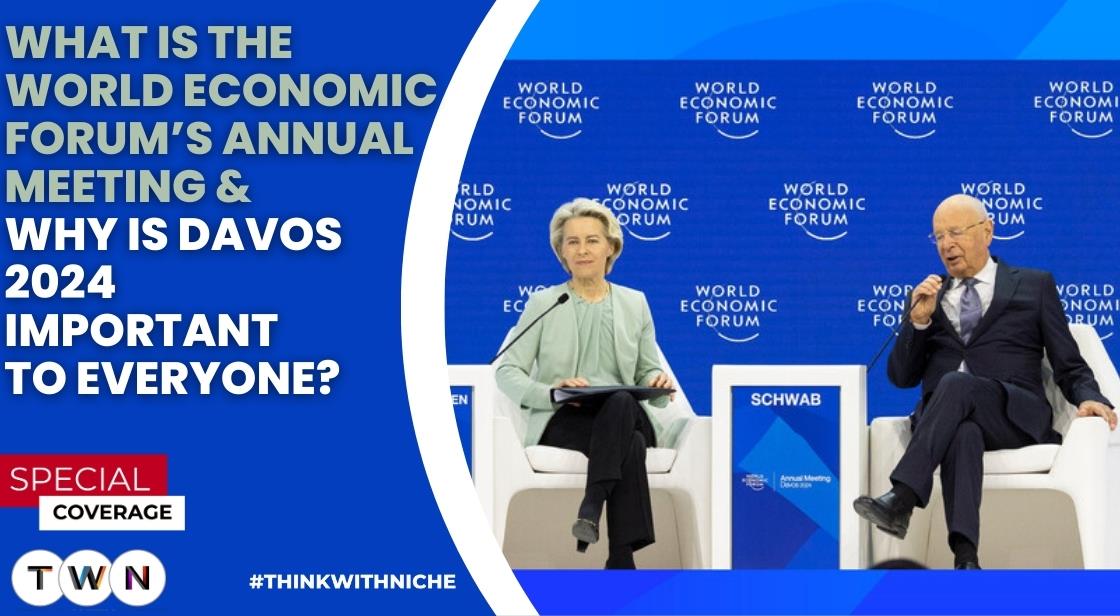What is World Economic Forum’s Annual Meeting and Why is Davos 2024 important to everyone?

Blog Post
In the crisp Alpine air of Davos, Switzerland, the World Economic Forum's 2024 annual meeting unfolded, a crucible where global leaders, titans of industry, and changemakers gathered to grapple with the challenges and opportunities shaping our world.
This year, the theme "Rebuilding Trust" resonated deeply, echoing across debates on climate change, war in Ukraine, economic uncertainty, and the very fabric of international cooperation. Yet, amidst the anxieties, Davos also witnessed moments of triumph, with India emerging as a star, securing billions in investment deals that fueled optimism for its economic future.
Discover the essence of the World Economic Forum's Annual Meeting, commonly known as Davos, and grasp why Davos 2024 holds paramount importance globally. Uncover the key themes, discussions, and influential figures shaping the international agenda.
From India's economic surge to urgent calls for action on climate change and global security, get ready to understand why Davos 2024 holds paramount importance for us all.
So, buckle up, as we embark on a journey through the triumphs, anxieties, and transformative whispers that emanated from the snow-capped peaks of Davos.
Understanding the World Economic Forum’s Annual Meeting and Significance of Davos 2024
The World Economic Forum (WEF) annually hosts a pivotal event known as the Davos meeting, situated in the picturesque Alpine village of Davos in Switzerland. Initiated in 1971 by Klaus Schwab, the WEF aims to enhance global conditions through public-private cooperation. The Annual Meeting, spanning four days, brings together prominent political, business, and societal leaders to shape global, regional, and industry agendas.
Unveiling Davos 2024: Significance and Impact of WEF’s Annual Gathering
The Davos Framework
Founded as a not-for-profit foundation, the WEF strives to improve the state of the world by fostering collaboration between public and private entities. The Annual Meeting, often colloquially referred to as 'Davos,' attracts heads of states, central bank leaders, CEOs, and diverse industry executives. Simultaneously, the Open Forum, a parallel event accessible to the public, runs alongside the Annual Meeting.
World Economic Forum's Mission: Building a Better Future Together
The World Economic Forum (WEF) boasts a concise yet ambitious mission: improving the state of the world by engaging business, political, academic, and other leaders of society to shape global, regional, and industry agendas. Let's unpack this mission statement to understand what drives the WEF's initiatives and activities:
Key Pillars of the Mission:
- Collaboration: The WEF emphasizes bringing together diverse stakeholders from various sectors. This collaborative approach aims to foster dialogue, understanding, and joint solutions to pressing global challenges.
- Leadership Engagement: The Forum actively engages prominent figures from political, economic, and social spheres. By providing a platform for leaders to exchange ideas and forge partnerships, the WEF seeks to influence global agendas and drive positive change.
- Shaping Agendas: The WEF focuses on setting priorities and driving action across different levels, from global issues like climate change and peacebuilding to regional concerns and specific industry challenges.
From Mission to Action:
The WEF translates its mission into tangible action through various initiatives and activities:
- Annual Meeting in Davos: This flagship event is where global leaders gather to discuss critical issues and collaborate on solutions.
- Reports and Research: The WEF publishes research and reports on key global topics, providing data-driven insights to inform policy-making and business decisions.
- Platforms and Initiatives: The Forum facilitates various platforms and initiatives focused on specific challenges, such as the Climate Action Platform and the Global Alliance for Women's Health.
- Partnerships and Networks: The WEF works with a network of partners, including governments, NGOs, and businesses, to implement solutions and drive progress on its mission.
Also Read: Key Outcomes of COP28: A Deep Dive into Crucial Decisions
Davos 2024 Themes and Priorities
Rebuilding Trust: Davos 2024 Focus
The overarching theme for Davos 2024 is 'Rebuilding Trust.' This theme underscores the imperative of restoring trust on three crucial levels: for the future, within societies, and among nations. Key principles guiding this trust restoration include transparency, consistency, and accountability.
-
Achieving Security and Cooperation
-
Focus on addressing security crises impacting governments globally.
-
Encouragement for long-term and structured engagement between nations to foster cooperation.
-
Key Speakers: Antonio Guterres (UN Secretary-General), Antony Blinken (US Secretary of State).
-
-
Creating Growth and Jobs
-
Exploration of a new economic framework to drive growth with a focus on people-centered prosperity.
-
Discussions on supply chain resilience, workforce reskilling, and navigating longer lifespans.
-
Key Speakers: Christine Lagarde (ECB President), Ngozi Okonjo-Iweala (WTO Director-General).
-
-
AI as a Driving Force
-
Deliberations on the role of Artificial Intelligence (AI) in economic and societal advancement.
-
Exploration of AI alongside transformative technologies like 5G, 6G, quantum computing, and biotechnology.
-
Key Speakers: Sam Altman (CEO, OpenAI), Jeremy Hunt (Chancellor of the Exchequer), Julie Sweet (CEO, Accenture).
-
-
Long-term Strategy for Climate, Nature, and Energy
-
Emphasis on devising long-term strategies for achieving carbon neutrality and nature-positivity.
-
Discussions on energy transition, circular fashion, and financial risks associated with climate change.
-
Key Speakers: Inger Andersen (UNEP Executive Director), Jane Goodall (Founder, Jane Goodall Institute).
-
Davos 2024 Significance for Everyone
Davos 2024 holds distinctive importance due to its timing and global influence. Traditionally occurring at the beginning of each year, it sets the stage for the months ahead, offering insights into political and economic trajectories. Criticized for being an elite gathering, Davos serves as a platform for expert commentary from leaders worldwide, shaping the narrative on critical issues.
-
Historical Significance of Davos 2024
-
Davos has witnessed historical moments, including the signing of the Davos Declaration in 1988, averting war between Turkey and Greece.
-
Nelson Mandela's impactful appearance in 1992 paved the way for South Africa's transformative journey.
-
-
Economic and Political Impact
-
Expert commentary shapes global outlooks and often leads to positive outcomes and partnerships.
-
JPMorgan's optimism and plans for expansion, despite wider industry concerns, reflect the potential positive impact.
-
-
Global Partnerships
-
Davos remains a nexus for fostering global collaborations, transcending political and economic boundaries.
-
The focus on 'Rebuilding Trust' in 2024 raises expectations for impactful outcomes and agreements.
-
Key Highlights from Davos 2024: Investments Soar for Indian States, RBI's Optimism, and Global Economic Insights
The third day at the annual World Economic Forum in Davos showcased a diverse array of global leaders, discussions, and impactful announcements. Notable figures like European Central Bank president Christine Lagarde, IMF’s Kristalina Georgieva, and French President Emmanuel Macron graced the event. However, it was Argentina's President Javier Milei who garnered significant attention. Meanwhile, India emerged as a key player, closing monumental agreements and drawing praise from global leaders.
India's Triumph at the Davos Summit
RBI's Optimistic Outlook
Reserve Bank of India (RBI) Governor Shaktikanta Das highlighted India's economic resilience, projecting a growth rate of 7% in the next fiscal year. Speaking at a CII session in WEF, Das emphasized India's stability amid a challenging global macroeconomic environment. He expressed confidence in achieving the RBI's 4% inflation target.
Blinken's Acclaim for India
US Secretary of State Antony Blinken praised India as an "extraordinary success story" under Prime Minister Narendra Modi's leadership. He acknowledged the positive impact on countless Indian lives and highlighted the strengthened relationship between India and the US, a deliberate effort by both nations.
Mega Investments in Indian States
Maharashtra, Telangana, and Karnataka closed monumental agreements, anticipating trillions of dollars in investments. Telangana sealed MoUs worth over ₹36,500 crore, with Adani Group committing ₹12,400 crore for diverse projects. Karnataka signed MoUs totaling ₹22,000 crore, including a ₹20,000 crore data center park by Web Werks.
Maharashtra's Economic Leap
Maharashtra claimed a staggering ₹1.4 trillion in MoUs, involving global giants like Berkshire Hathaway and Greenko Energy Projects. Adani Group pledged ₹50,000 crore for a 1 GW data center over the next decade, contributing to the state's economic prosperity.
Global Perspectives on Climate and Economy
Blinken's Call for Palestinian Statehood
US Secretary of State Antony Blinken emphasized the necessity of granting statehood to Palestine for Israel to achieve "genuine security." He acknowledged the challenges in reaching this goal, requiring difficult decisions and an open mindset.
UN's Plea to Phase Out Fossil Fuels
UN Secretary-General Antonio Guterres called for united global action to phase out fossil fuels, stressing its inevitability. IMF chief Kristalina Georgieva underscored the need to shift $7 trillion in subsidies annually to combat climate change effectively.
Pope's Ethical Standards Appeal
Pope Francis urged business leaders at Davos to prioritize ethical standards over profit pursuit. In a letter, he emphasized the global need to address economic injustices, hunger, and natural resource exploitation, citing these as root causes of conflicts.
Other Highlights of Davos 2024
Shipping Concerns
CEOs of leading freight carriers anticipate disruptions in shipping due to Red Sea threats, potentially causing extended delays and higher transport costs. The rerouting of ships around southern Africa may lead to imbalances in container capacity, impacting Asia in the coming weeks.
Global Alliance for Women's Health
The World Economic Forum launched a global alliance for women's health, envisioning a $1 trillion annual economic boost by 2040. Addressing gender-specific health challenges could contribute a 1.7% increase in per capita GDP, unlocking $3 in economic growth for every $1 invested.
JPMorgan's Positive Outlook
Despite talks of job cuts on Wall Street, JPMorgan President Daniel Pinto expressed optimism, revealing plans to expand headcount. The bank sees opportunities in US wealth management, international retail, and a revival in deal-making.
President Milei's Impact
Argentina's President Javier Milei, a self-proclaimed 'anarcho-capitalist,' gained attention with over 60 meeting requests at Davos. He praised free markets and criticized socialism during his special address, marking his first overseas tour.
IMF Chief Kristalina Georgieva's approach
Despite challenges such as the long-term consequences of the pandemic, the Ukraine conflict, geo-economic fragmentation, monetary policy tightening, and extreme weather events, the global economy demonstrated remarkable resilience. Kristalina Georgieva emphasized this resilience during the Bloomberg House event in Davos, stating, "The world economy has proven to be remarkably resilient."
Contrary to the less optimistic October outlook, Kristalina Georgieva, Managing Director of the International Monetary Fund announced that 2023 performed better than anticipated, albeit by a small margin. This positive development is expected to have a favorable impact as the world transitions into 2024. Georgieva expressed confidence, noting, "There is some wind coming from 2023 into 2024."
Blinken's Aircraft Troubles
US Secretary of State Antony Blinken faced travel challenges, unable to fly home from Davos as scheduled due to critical issues with the aircraft. An oxygen leak, previously detected, deemed the modified Boeing 737 unsafe for flight.
Long-Term Impact and Uncertainties:
- Will agreements and declarations translate into tangible action? The real historical significance of Davos 2024 will depend on whether the discussions and agreements translate into concrete, long-term actions that address the pressing challenges facing our world.
- Will emerging trends like AI and the focus on women's health lead to positive transformation? While these trends hold great promise, challenges and ethical considerations need to be addressed to ensure they benefit all segments of society.
- Can the "Rebuilding Trust" theme lead to meaningful progress? Rebuilding trust on a global scale is a complex and long-term endeavor. Whether Davos 2024 marks a turning point remains to be seen.
Overall, expanding on the historical significance of Davos 2024 should look beyond immediate headlines and consider the potential long-term implications of the emerging trends, collaborations, and discussions that took place. By analyzing these with a critical eye and considering potential challenges and uncertainties, you can offer a more nuanced and thought-provoking perspective on the event's historical footprint.
Conclusion: Davos 2024 - A Crossroads of Hope and Challenges
Davos 2024, echoing with the theme of "Rebuilding Trust," wasn't just a gathering of elites; it was a microcosm of the world's anxieties and aspirations. While the shadows of war, climate change, and economic uncertainties loomed large, the summit also witnessed moments of triumph, collaboration, and renewed hope.
India's meteoric rise as an investment hub, the launch of the global alliance for women's health, and the collective focus on AI and emerging technologies all point towards a future brimming with possibilities. Yet, the road ahead is paved with challenges. Will the agreements forged at Davos translate into tangible action? Can we truly rebuild trust on a global scale and tackle the complex issues that threaten our planet and our future?
The answers lie not in the glitzy halls of Davos, but in the collective efforts of individuals, communities, and nations. Davos 2024 served as a stark reminder that the time for talk is over; it is time for action.
If we can harness the spirit of collaboration, innovation, and ethical responsibility that flickered at the summit, then perhaps, just perhaps, the historical significance of Davos 2024 will not be its pronouncements, but its spark of a brighter, more equitable, and sustainable future for all.
You May Like
EDITOR’S CHOICE












